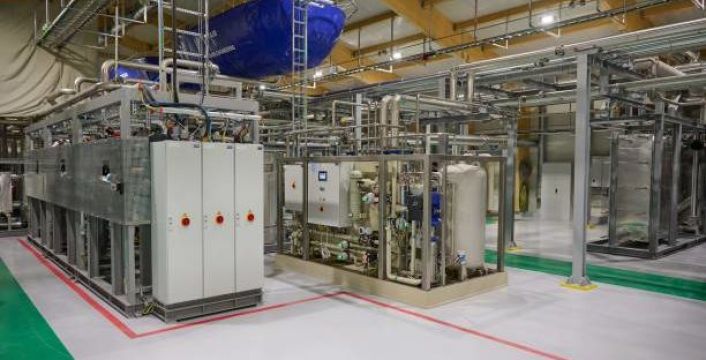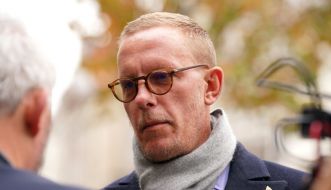As a key U.N. summit in Glasgow this week searches for ways to cut threats from global warming, one answer may lie in an unlikely place about 8,000 kilometres away: the tiny Gulf nation of Oman.
A team of scientists and engineers there have been testing a new technology that captures planet-warming carbon dioxide from the atmosphere then injects it into Oman's ample stores of peridotite rock, where it is stored away.
"From our rough calculation, in the region we have enough peridotite to mineralise up to 50 trillion tonnes of CO2 – almost every single emission by humankind since the industrial revolution," said Talal Hasan, who heads Omani carbon removal firm 44.01.
The company and its partner Climeworks AG, a Swiss start-up that specialises in direct air capture (DAC) of carbon, say "mineralising" the gas into rock is "the safest, most scalable, and permanent approach of CO2 storage".
Removing carbon dioxide from the air has emerged as a core part of many national plans to limit rising temperatures to 1.5 degrees Celsius, particularly as climate-damaging emissions from fossil fuel use continue to rise.
In 2018, the Intergovernmental Panel on Climate Change (IPCC) found emissions cuts by industries would not be enough to attain the 1.5C goal, saying so-called "negative emissions" would be needed to hold temperatures down in case of an overshoot.
Climeworks' massive Iceland plant Orca can suck out about 4,000 tonnes of carbon dioxide each year – nearly half of what the world's 15 DAC plants pull out of the atmosphere annually.
That is still a drop in the ocean compared to global CO2 emissions, which are set to increase by nearly 5 per cent in 2021 to 33 billion tonnes, according to the International Energy Agency's Global Energy Review 2021.
Oman might seem an unlikely player to help bridge the emissions gap.
Global CO2 emissions
The sultanate of about 5 million people borders some of the top per capita emitters of climate-damaging emissions in the world – oil and gas-rich Saudi Arabia and the United Arab Emirates (UAE).
It is also home, however, to some of the world's largest, most easily accessible swathes of peridotite.
Hasan said 44.01 and Climeworks are still waiting for the results of their initial tests in Oman this year, but estimated they could mineralise one tonne of carbon dioxide for every tonne of peridotite.
The process could be more secure than other available options, such as pumping carbon into depleted oil fields.
"It's a very safe, long-term, essentially permanent carbon dioxide storage. So it doesn't have the concerns of other projects - including, will it leak? Are there safety issues?" said Robin Mills, chief executive at consulting firm Qamar Energy.
Generating the energy to run the plants themselves could eventually be done sustainably if large-scale solar power plants are installed.
While Oman has pledged to reduce its greenhouse gas emissions by just 7 per cent by 2030, neighboring Saudi and the UAE recently promised net-zero emissions by 2060 and 2050 respectively - though neither intends to move swiftly away from fossil fuels.
The two oil giants have one large-scale carbon storage facility each, but they capture the emissions produced from other industrial processes – rather than sucking out pre-existing emissions from the air, as Oman's project would do.
Oman's peridotite could help launch "direct air capture" of emissions in the region, a so-far hugely expensive proposition.
Storage space
The 44.01-Climeworks project could eventually "sell" storage space in the rock to other countries or companies looking to bring their net emissions down - known as a carbon credit.
The peridotite's "verifiable and permanent" storage would generate "a very high-quality carbon credit," said Mills.
"As countries come under pressure to cut net emissions verifiably, these kinds of credits would trade at high prices," he said.
Companies are already buying and selling carbon credits, but Hasan said the "disjointed" nature of the market required some more regulated pricing - something that could emerge out of this week's COP26 climate summit.
"Everyone has promised more announcements on this at the COP – so we're looking for a bit more clarity," Hasan said.
The technology itself remains extremely pricy: capturing carbon from the atmosphere costs about $600 per tonne, but Climeworks project lead Dirk Nuber said the price could come down to $200 with the right investments.
"Compare it with solar or wind power - in the beginning, everyone said 'this is science fiction, it's too expensive'," Nuber told the Thomson Reuters Foundation.
"We're in the same position now. Unless you go really big, you can't get it for cheap," he said.
One environmental group, the Climate Action Network, has said that price tag made DAC "the most expensive atmospheric CO2 removal approach".
It did not think DAC projects could shoulder significant emissions reductions fast enough to keep global climate goals in view, and therefore should have "no place" in immediate decarbonisation planning.
Greenpeace activists fear that ramping up the carbon credit system through DAC could allow emitters to simply pay to pollute - instead of actually reduce their carbon output.
"The carbon credit system opens the door to significant utilisation of greenwashing activity in order to promote financial gain for different countries," said Ahmed El Droubi, senior campaigner for the Middle East and North Africa at Greenpeace.
"The primary focus should be on reducing emissions. We want real zero," he added.







